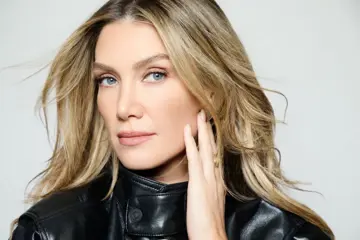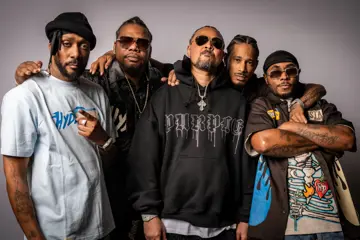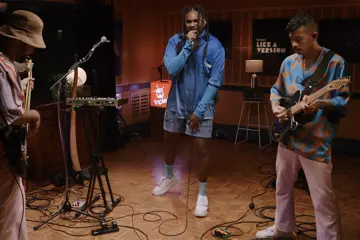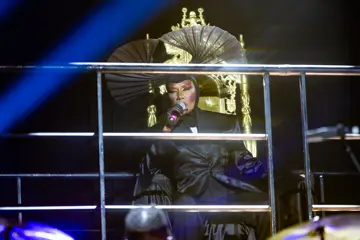The Australian music industry has been rocked this month, as just two local artists have appeared in the ARIA top 40 Singles chart in consecutive weeks and according to some of the country’s leading figures, this is a serious and potentially dangerous problem that needs to be addressed immediately.
Bliss N Eso's Moments featuring Gavin James (#30) and Dean Lewis' Waves (#16) are the only two Australian tracks currently featured in the top 40, while only two weeks ago, Starley's Call On Me was the only other local song on the list.
The figures are shocking alone, without even comparing it to the US Billboard top 40 which this week features 31 songs by American artists, or even the UK's top 40 singles, which includes 13 British recordings.
Even more daunting is the fact that in the entire ARIA top 100 this week, just four more Aussie songs are included; PNAU's Chameleon (#55), Amy Shark's Adore (#66) and Weekends (#78) and Flume's Never Be Like You featuring Kai (#83).
Australian music mogul and Mushroom Group founder Michael Gudinski says that there are many elements to the issue at hand and one of those is radio.
"Radio is no longer a leader, it's much more of a follower," Gudinski tells The Music.
"The problem is that radio can see the songs internationally that are really big, so it's a catch 22.
Don't miss a beat with our FREE daily newsletter
"But it's a situation that, if something is not dealt with, it's going to make it even more so that Australian artists have got to work internationally before they break their home country and that's not a good thing."
Commercial Radio Australia's current policy requires radio broadcasters to play at least 25% Australian-made music between 6am and midnight and with streaming now the most popular platform for fans to access music, the problem is mounting.
ARIA's recent announcement that streaming data is now included in its chart figures was initially believed to work wonders and help boost Aussie artists up the chart, however Gudinski claims it has only made the situation worse.
"If [Australian artists] can really make the impact on iTunes and the actual ARIA chart, that gives radio a lot more confidence," he says.
"It's totally made things worse for Australian artists because Australian artists [don't] get the benefit of international playlists.”
Head of Chugg Music, Andrew Stone, has echoed Gudinski's comments on streaming, telling The Music that now not only do Australian acts have to compete with international artists on locally-made playlists, but they have also been "completely shut out of the international playlists".
"Australian fans don't discriminate between a home grown playlist so there's no way for Australian artists to get ahead unless they have a big international team pushing them as well," Stone explains.
"Commercial radio looks at streaming numbers, ARIA charts and Shazams as to whether the songs are connecting, but without a leg up on any platform it's very hard to compete.
"There's also very few prime-time TV opportunities for artists to get a spike in sales that can help build the story."
Stone continues, "If we're trying to break the artist internationally they're all looking for a story out of Australia – and unfortunately, despite a song being the #1 Australian song in the country, #15 on iTunes and #38 on ARIA isn’t enough to cut through and have people pay attention."
It's no secret that international exposure can do a hell of a lot for our acts — just ask names like Empire Of The Sun, Tame Impala and King Gizzard & The Lizard Wizard who have all played on US talk shows such as The Tonight Show With Jimmy Fallon or Ellen. Or Amy Shark who received public praise by blink-182's Tom Delonge and Lena Dunham. Or even Bag Raiders who, thanks to a viral meme of all things, saw their 2009 hit Shooting Stars crack the US dance charts for the first time this year.
Managing Director of SGC Media, Stephen Green, says that Australia has been hit with "a perfect storm of globalisation" and as Stone also claims, more and more local fans are streaming internationally-curated playlists.
"Our local music can be on as many Australian-curated playlists as we like, but if consumers are listening to a playlist curated out of the States (and it's never clear from a consumer point of view what is or isn't), they aren't going to hear new Australian tracks," Green tells The Music.
"On top of that, radio gave up trying to break new music. They'll add new stuff to nights or late nights which don't have enough audiences to break a song, but they won't jump in on something across the day when people are really listening because they are chart driven. It becomes a vicious cycle where the chart is internationally focused because of the global nature of streaming services then radio falls in line.
"We're in a self-perpetuating loop that means that if you really believe that Australian music is essential to our culture, we have to stand up now and say the system is broken.
"It's not about blaming streaming or radio - people in there want Australian music to thrive as much as anyone. It's also not about re-weighting the chart to pretend like our songs are being heard when they aren't.
"What we need is to find a solution that is born from a coalition across the stakeholders that stand up and say that Australian music is important and that we have a complex structural problem that's worth solving."















